






































































MONTANE Care is delighted to confirm the successful sale of Sable Cottage Nursing Home in Kelsall, Tarporley, an established and well regarded care setting.
The transaction marks the full exit of Sunil Patel from the care sector, as he pursues new opportunities, and ushers in fresh leadership under Arun Jothinath of JAS Care Homes Ltd.
Sable Cottage Nursing Home has long served its local community, situated amid the tranquil Cheshire countryside just a few miles from Tarporley and adjacent to Delamere Forest.
The home is purpose built, accommodating some 38 residents across mainly single and en-suite rooms, and provides specialist services including nursing care, dementia support, respite care and residential provision.
Historically, its Care Quality Commission rating has been “Good” overall, reflecting both strengths established within the home and the potential for further growth under new ownership.
From the outset, Arun entered the purchase with clarity of vision, mindful of the responsibility inherent in acquiring a nursing home.
Reflecting on the acquisition, he valued the support and guidance
Montane Care provided, helping to demystify the complexities of transition and ensure a practical, structured approach.
Arun spoke of how our consistent communication, in depth sector understanding and steady oversight made the transaction more assured and manageable at every phase.
Sunil, having committed many years to leading Sable Cottage, entrusted Montane Care to manage the sale process in full.
Reflecting on the completed transaction, he emphasised the professionalism and responsiveness of the team, noting how well the process was coordinated among all parties.
He described the experience as efficient, discreet and managed with attention to detail, a transaction that respected the home’s legacy and delivered the right outcome for residents, staff, and himself.
The legal teams on both sides played a crucial role in ensuring a timely and robust completion.
Sunil was represented by Matthew Dootson of Clarke Willmott Solicitors in Manchester, who acknowledged the importance of Montane Care’s input in driving the final stages.
He said: “The time you spent pushing matters forward in the
closing period was extremely helpful.”
This feedback underlines the way our role extends beyond introduction, into momentum maintenance and issue resolution.
Representing Arun was Jonathan Hill of Shakespeare Martineau, who also commended the structured process and clarity of dialogue that underpinned the transaction.
During a recent Healthwatch “enter and view” visit in mid 2025, residents and observers praised the home’s homely environment, warm staff interactions, well appreciated dining experience, and the involvement of residents in the garden and communal spaces, elements that speak to a culture of dignity, choice and engagement.
This living culture served as a solid foundation for Arun to build upon as he steps into leadership.
This successful transfer of Sable Cottage illustrates the dynamic nature of the care sector today.
Experienced operators like Sunil are choosing to exit at the right time, while new operators, like Arun, bring fresh energy, ambition, and a commitment to preserving and evolving quality of care. The deal also demonstrates that with the right professional support, first time buyers and
expanding operators can navigate challenges with confidence and assume responsibility for well operated, mission driven homes.
At Montane Care, we understand that selling or acquiring a care home is never just a financial transaction, it’s a pivotal decision that affects residents, staff, families and communities.
That’s why we offer a discreet, values-led service, shaped by deep sector experience and a commitment to delivering positive outcomes at every stage.
Whether it’s a single-site sale or part of a wider group transaction, we work with care, clarity and professionalism to ensure a smooth and respectful process.
Darren Edwards of Montane Care added: “I was proud to represent Sunil Patel in the successful sale of Sable Cottage Nursing Home.
“It was a pleasure to support him through his exit from the sector, and I’d like to sincerely thank everyone involved, both sets of solicitors, the buyer, and all supporting professionals.”
If you’re considering selling your care business or exploring an acquisition, I’d welcome a confidential conversation. Please contact me on 07720 653322 or email darren.edwards@montanecare.co.uk
CARERS at dementia specialist Belong have earned a big thumbs up from residents after taking on the challenge of learning British Sign Language to support older people who are hard of hearing at the care village.
Prompted by the imminent arrival of new resident and deaf Warringtonian, Sybil Ward, colleagues enrolled on their entry level BSL certification under the tuition of Warrington and Vale Royal College.
The course was tailored specially to meet the aim of being able to communicate with and assist Sybil to enjoy everything Belong life has to offer.
Experience coordinator Louise Kelly said: “We were really touched when we met our Sybil, and it was important to include her warmth and personality in our family as it’s our goal to be inclusive of everyone’s needs.
“The Greenall House team and key colleagues embraced the BSL challenge and we’re now looking to sign up more to keep our signing culture going indefinitely.”

92-year-old Sybil chose to reside on one of Belong Warrington’s six ‘households’, a family-sized cohort of a dozen older people whose independence is assisted with 24-hour carers whilst they enjoy a shared communal lounge, kitchen and outdoor space.
The approach is designed to facilitate relationships with fellow residents and support workers, meaning the preferences and needs of individuals can be met whilst
building a community around them.
The team took inspiration from Old Hands: New Tricks, the recent, heartening TV documentary featuring care village residents learning to sign.
As a not-for-profit operator, Belong Warrington continually reinvests to enhance its care provision, including exploring ideas and opportunities to make life better for those in its care.
With an estimated 75 per cent of older people in care environments living with hearing loss, rising to 80 per cent by 2032, the introduction of BSL is anticipated as another measure to reduce loneliness and social isolation, as well improve customers’ overall health and wellbeing.
Louise added: “The feedback from our residents has been fantastic – they really appreciate our efforts. We’re super proud of all our colleagues who’ve earned their certificates, and in turn, they are pleased to have learned a new skill to use in their everyday work.
“It goes to show that communication really is more than just words; it’s about connection.”
At Script Media, we try to get things right but occasionally, we make mistakes. If you have a complaint about a story featured in our magazine or on our website, please, in the first instance, contact us by email: dm@scriptmediagroup.co.uk We abide by the Editors’ Code of Practice as demanded by the Independent Press Standards Organisation. For details on the code and what to do should you be unsatisfied with the way we handle your complaint, please visit www.ipso.co.uk








www.caringuk.co.uk



Advertising Healthcare Product Manager: Bev Green Tel: 01226 734288 bg@scriptmediagroup.co.uk

Editorial Operations Director: Dominic Musgrave Tel: 01226 734407 dm@scriptmediagroup.co.uk
Studio Manager: Paul Hopkinson Tel: 01226 734711 ph@scriptmediagroup.co.uk
Assistant Studio Manager: Scott Firth Tel: 01226 734414 sf@scriptmediagroup.co.uk
Publishers Script Media 47 Church Street, Barnsley, South Yorkshire S70 2AS. info@caring-uk.co.uk
Database enquiries to: 01226 734473 returns@scriptmediagroup. co.uk
Whilst every effort is made to ensure the accuracy of all content, the publishers do not accept liability for error, printed or otherwise, that may occur.
Follow us on Twitter @caringuk





In his latest in a series of regular columns, care provider Mike Padgham, who is chair of the Independent Care Group, gives us his personal take on the big issues facing social care.
AS WE head towards the Budget, I find myself more worried — and, paradoxically, more determined — than ever before.
Because I believe social care in this country stands at a genuine crossroads.
The choices made in the next few weeks will determine whether our sector is helped to recover, reform and thrive, or whether we continue down a road that leads only to collapse.
We’ve been warning about this moment for years. But this time, the warning lights are brighter than ever.
The latest Skills for Care report, released last month, shows that the adult social care sector now contributes a staggering £77.8billion to the English economy – up more than 12 per cent in a year.
We employ 1.6 million people across more than 17,900 organisations. In other words, this is a major national industry — one larger than the NHS in workforce size and vital to the country’s economic and social fabric.
And yet, while the economic value of our work continues to grow, the fragility beneath the surface deepens.
The vacancy rate has fallen slightly to around seven per cent – about 111,000 posts – but let’s be honest about why.
Much of that improvement has been achieved through overseas recruitment, particularly since restrictions were eased in 2022.
Those routes are now being tightened again, and the sector faces a cliff-edge. If international recruitment slows or stops, vacancies will shoot straight back up. It’s a temporary blip, not a long-term fix.
We have relied on dedicated staff from overseas to keep services running, and they have made an invaluable contribution. But a sustainable care system must not depend on emergency overseas recruitment to plug the gaps left by years of underinvestment and poor pay.
The proportion of care staff with

Mike Padgham
a basic Level 2 qualification has fallen to 38 per cent, down from 41 per cent a year ago, and that skills gap is widening. This is not a sustainable workforce model.
The Skills for Care report projects we’ll need another 470,000 workers by 2040 just to meet expected demand.
Where are they going to come from when pay, status and job security lag so far behind other sectors?
The Government’s announcement of a Fair Pay Agreement for adult social care was, in principle, a huge step forward – and I applaud it. Sector bodies like ours have long called for national recognition of the essential nature of care work.
But we must be honest: the £500million allocated for the FPA “won’t touch the sides.”
The Homecare Association estimates that simply raising homecare pay to £15 an hour would require an extra £2.6billion in funding.
The reality is that unless this initiative is properly funded, it risks becoming another headline that raises hopes but delivers little lasting change.
We support fair pay. We welcome a framework that rewards and retains staff. But it must come with fair funding – or it becomes an empty promise.
“The coming Budget must mark the moment that social care is no longer treated as a cost to be contained, but as an investment – in jobs, in communities, in wellbeing, and in the economy itself.”
Meanwhile, local authorities –who commission the majority of publicly funded care – remain under intolerable financial pressure.
The Institute for Government has shown that despite a 15 per cent real-terms increase in adult social care spending since 2019/20, the number of people actually receiving care has not risen. Inflation, wage costs, and new statutory duties have swallowed those increases.
Local authorities cannot continue to squeeze providers on costs and then expect the quality of care to improve.
The two things simply don’t add up. You can’t keep asking us to do more, with less, and pretend that quality won’t suffer.
I fear deeply for those relying on publicly funded care. They are paying the price for a system that is being stretched to its limits. We cannot continue like this.
At the same time, there has been no visible movement of funding from hospitals into the community, despite clear commitments from the Secretary of State to rebalance the system.
It can’t be a fair system that talks about integration between health and social care when the NHS budget dwarfs, by a huge margin, the budget for adult social care.
Until we recognise that both sides of the system must be funded properly and proportionately, we will never achieve true integration.
It is a tragic irony that billions are spent on delayed discharges and acute care, while the very community services that could prevent those admissions are starved of investment.
If the Treasury wants to improve efficiency and value for money across the public sector, the answer is staring it in the face: fund social care properly, and you reduce pressure on the NHS overnight.
There are also straightforward, practical changes that would cost the government little but deliver huge benefit.
Ending the VAT anomaly that prevents care providers reclaiming VAT would instantly free up capital for investment in technology, facilities, and training.
It’s a nonsensical situation – one that holds back innovation and penalises providers for simply trying to modernise.
Likewise, the recent increase in employers’ National Insurance
contributions hit our sector particularly hard.
Care is labour-intensive and heavily reliant on part-time workers – especially women –who already operate on tight margins. Every extra cost on payroll threatens jobs and service continuity.
All of this points to one simple truth: we are not asking for special treatment. We are asking for fair recognition – of our economic value, our social purpose, and our role in the nation’s health.
The government speaks of “growth.” Well, social care is a growth sector – if only it is given the space and support to flourish. We want to work with ministers, not against them. Providers across the country stand ready to contribute to reform.
But we need a government willing to see social care as an essential part of the solution, not an inconvenient line in the budget spreadsheet.
We also cannot ignore the wider human impact. We are caring for a damaged generation – older people living longer, often with multiple conditions, and too many living with dementia, which must now be treated as a national priority. Dementia care should not be an afterthought; it should be at the centre of every social-care strategy.
We have an opportunity, right now, to turn the tide.
The coming Budget must mark the moment that social care is no longer treated as a cost to be contained, but as an investment – in jobs, in communities, in wellbeing, and in the economy itself.
We were rightly praised during the pandemic. But since then, once again, we have been forgotten. Let’s not make the same mistake twice.
This new Labour government has a real chance to build a legacy – to create a system that truly values care, supports its workforce, and recognises the immense contribution we make every single day.
So, I say this to the Chancellor: please, give us the tools to do the job.
Social care doesn’t need sympathy. It needs fair funding, practical reform, and genuine partnership.
Do that – and we’ll deliver not just care, but hope, dignity, and economic renewal for the whole country.
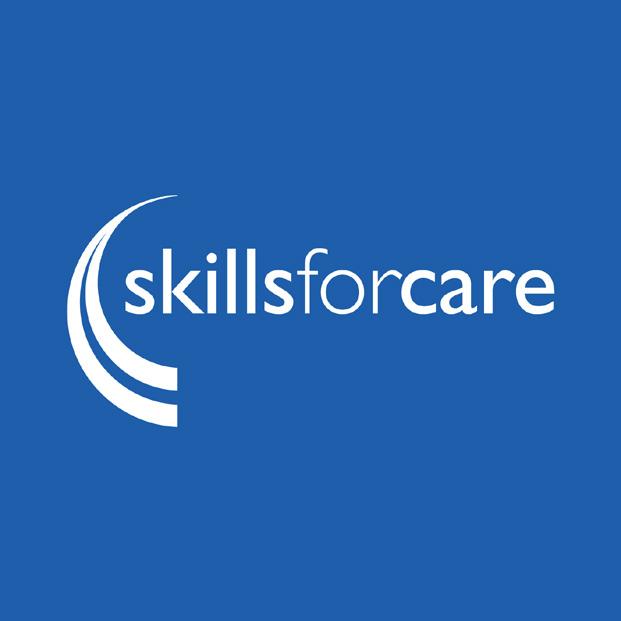
We know the importance of making connections outside your own organisation, the power of peer support and the value of providing a safe space where you can be open and support each other’s challenges.
That is why Skills for Care facilitates different networks, for leaders and managers at all levels. These include our local networks for registered managers, our regional deputy manager networks, and our regional networks for CEOs and nominated individuals (NIs).
Over 96% of those who attend a Skills for Care network would recommend joining one, so why not come along to learn more.
Skills for Care supports over 130 local networks covering every local authority in England. They offer managers a safe, supportive space to connect with peers, share challenges, and build a strong collective identity within their local area.
Our six regional deputy manager networks provide the opportunity for deputies, team leaders and aspiring leaders to come together, share knowledge and best practice and to learn with others.
Our NI and CEO networks provide a space for meaningful strategic collaboration with other leaders, managers, and stakeholders to discuss the implications of national, regional and local strategies and opportunities for providers and their workforce.
Find out more about our dedicated networks to support leaders and managers at www.skillsforcare.org.uk/DedicatedNetworks

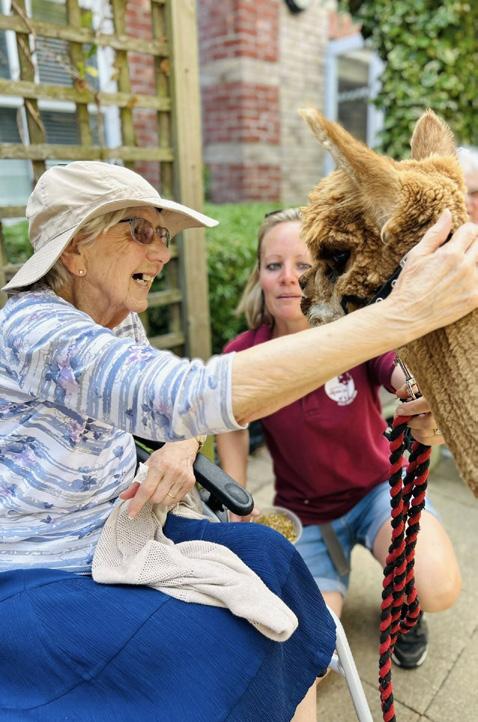
Hunters Down welcomed a group of gentle and friendly animals from Gorefield Alpacas, creating an unforgettable experience for the care home community. The visit offered a unique opportunity for people to feed and stroke the animals, whilst learning some interesting facts about them. The team from Gorefield were warm, knowledgeable and highly engaging, making the experience enjoyable for everyone involved. Several alpacas were guided through the home to visit people who were unable to attend the main event, allowing them to enjoy one-on-one time from the comfort of their rooms. These personal interactions brought a great sense of joy, comfort and connection, highlighting the importance of meaningful activities and how they enhance well-being.
A HOME care provider celebrating its 30th anniversary this year has announced a major new partnership with the Bedfordshire, Luton and Milton Keynes integrated care board to support patients recovering from delirium after hospital discharge.
The partnership will see Abbots Care deliver specialist shortterm live-in care for people leaving hospital with delirium, helping them recover safely and comfortably in their own homes.
The new service, commissioned under the Delirium Pathway, is designed to reduce hospital readmissions and support individuals in regaining confidence and independence after acute illness.
“We’re incredibly proud to be supporting the Bedfordshire, Luton and Milton Keynes integrated care board with this vital initiative,” said Camille Leavold MBE, CEO of Abbots Care.
“Delirium is often underrecognised but can have a serious impact on older adults, particularly after hospital stays. Our live-in care workers are trained to provide not just handson support, but the consistency and calm needed to aid recovery.”

The move marks a significant expansion of Abbots Care’s livein care service in Bedfordshire. In the coming months the organisation will begin rolling out a broader campaign to raise awareness of live-in care options across the county— an increasingly sought-after alternative to residential care.
Abbots Care’s live-in care offering includes round-theclock support with personal care, medication, nutrition and companionship, all delivered by highly trained care workers who live alongside clients in their homes.
The timing of this development aligns with wider national concern
about hospital discharge delays and adult social care capacity.
Recent reports show that nearly 14,000 hospital beds in England remain occupied by patients who are medically ready for discharge—many of whom could safely return home with the right support in place.
At the same time, demand for home-based care is rising rapidly. Across England, 72 per cent of all council-funded long-term care is now provided in people’s own homes, and care providers are being called upon to innovate and expand (CareLineLive, 2024).
Abbots Care, supports more than 1,300 clients each week across Hertfordshire, Buckinghamshire and Dorset, and has recently reached the milestone of delivering one million hours of care in the past year alone.
Camille added: “This new service is about putting people first – supporting their recovery, protecting their dignity, and preventing avoidable hospital readmissions.
“As we grow our live-in care offer in Bedfordshire, we want local residents to know they have a compassionate, professional option close to home.”
















































COMPANIES across the country looking to recruit the right people for their businesses are increasingly harnessing the benefits of the no-fee recruitment service provided by Jobcentre Plus.
With more businesses finding it hard to fill their vacancies with suitable candidates, the Jobcentre Plus professional recruitment service aims to back your business, while providing opportunities for jobseekers in the local community.
This comprehensive support includes providing expert advice on recruitment best practice, help with advertising your jobs locally, finding the right candidates for your business, shortlisting CVs, and even giving you the space to interview at a local jobcentre. They can also assist with setting up work trials, work experience and apprenticeships; and provide guidance on employing people with disabilities or health conditions.
City and County Healthcare (CCH) Group, the largest care company in the UK, is one of many businesses benefitting from this service. Regional Recruiter, Gary praises the professional support received.
“The Jobcentre does all the legwork for me, and I just pre-screen the candidates. Nothing is too much for them, so it’s great.”
Before using the Jobcentre Plus service, Gary had his fair share of challenges in finding the right candidates in the care industry.
“At the time we had different ways of recruiting, like flyer drops and adverts in the paper, which cost a lot of money. We did a lot of word of mouth as well, but it was a bit difficult until we contacted the local Jobcentre.”
Jobcentre Plus Employer Adviser Liam, who has been working on the recruitment
strategy in collaboration with CCH Group, says: “We look at getting the right candidates in place to save the employer’s time and money. As an Employer Adviser it’s all about making sure you know it’s the right job, for the right person, at the right time, so a lot of work goes on behind the scenes.”
The support provided by Jobcentre Plus has made a difference in recruiting the right local people, which is one of the priorities for Gary. “They know the area better than we do. I don’t live in Blackpool. But they are local, and they know the surroundings a lot better,” he says, adding: “So it’s easy when we are recruiting for certain postcodes.”
Thanks to this service, CCH Group has successfully recruited local candidates for a wide variety of roles – including care assistants and support workers for supported living. “If you are an employer thinking about using this service, go and have a chat with an Employer Adviser and see what they can do for you”, Gary concludes.
Whether you have 1 vacancy or 100, our Jobcentre Plus Employer Advisers can help to take the hassle out of recruitment, leaving you to get on with business.
To find out what we can offer your business, visit business.gov.uk/recruit and fill out our simple enquiry form. A local Employer Adviser will then call you back to discuss your recruitment needs and how we can support you.
You can also find out about our full range of services at gov.uk/jobcentre-plushelp-for-recruiters/ recruitment-advice-andsupport Eligibility criteria apply

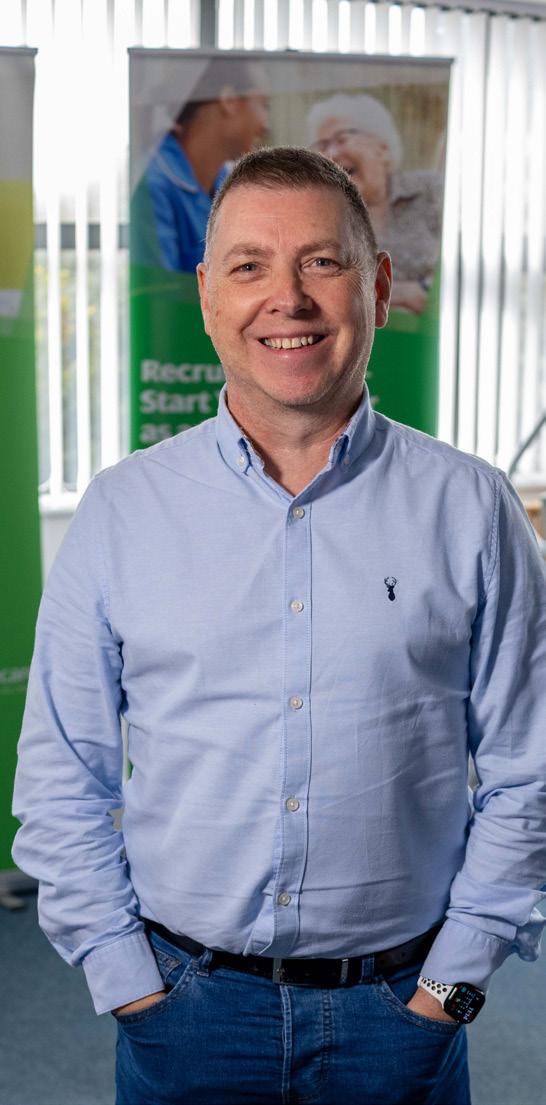
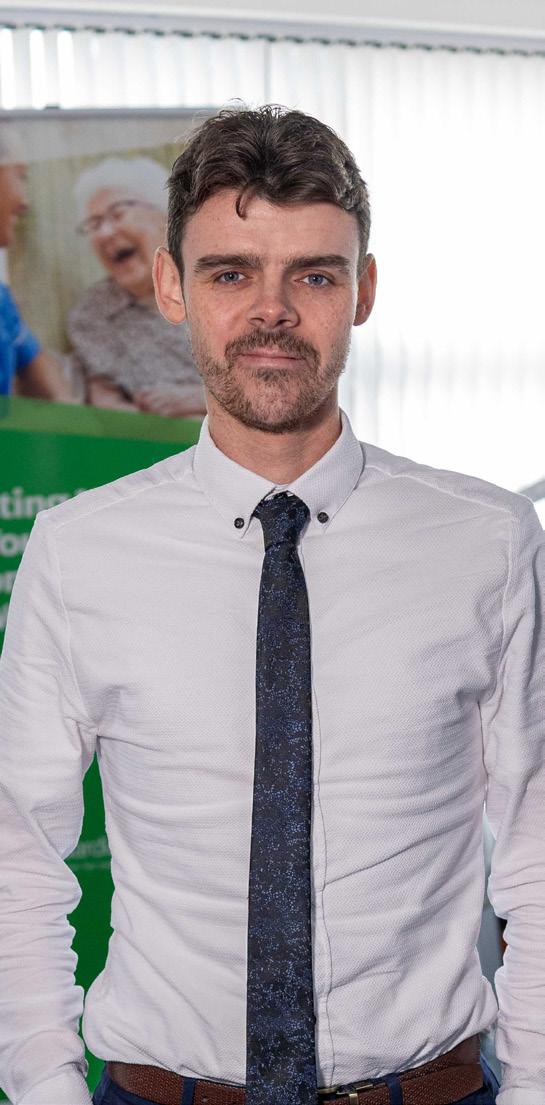

PORTSDOWN View care home in Bedhampton has launched its ‘Dementia Perspective Training’ project – a new monthly programme that helps participants see life through the eyes of those living with the condition.
Through experiential learning, hands-on activities, and structured pre- and postsession reflection, the sessions are designed to help carers learn about the condition whilst reflecting on their own approaches to dementia care.
During the sessions, participants are taken into a darkened room lit up with bright multi-coloured lights, and are then subjected to a barrage of sounds through headphones – from clattering cutlery, overlapping voices, to the sound of car horns and sirens.
They are then asked to perform simple tasks whilst navigating this barrage of sensory input; including folding clothes, organising playing cards, or solving simple colour-based puzzles.
By simulating some of the sensory and cognitive challenges that dementia can bring,

participants find that everyday tasks which usually feel easy –like getting dressed or following a conversation – can become tricky, confusing or frustrating.
Feedback from the first session has been positive – with carers saying even 15 minutes in the room was a “real eye-opener” on the daily challenges of living with dementia.
Andrew Wrensch, Connaught
Care’s learning, training and development manager, said:
“Understanding dementia isn’t about facts and figures – it’s about feeling what life might be like for someone with the condition.
“Bridging the knowledge gap isn’t easy, but hopefully this project goes some way towards that goal. We believe it’s impossible to offer exceptional
care without truly understanding what it’s like to walk a mile in a resident’s shoes.”
The idea for the sessions came from Andrew’s experience of a ‘Dementia Tour Bus’; a similar initiative offered by the Training 2 Care charity.
Seeing the success of the scheme, he wanted to bring these kinds of immersive sessions in-house as a regular part of Portsdown View’s specialist dementia care training. Working with the team he developed a new set of activities based on the idea and began hosting the sessions on-site at the home.
Andrew added: “With dementia affecting millions of people around the country, the need for compassion-led care has never been greater.
“These sessions aren’t about ticking a box – they’re about changing perspectives, sparking conversations, and helping carers know how to respond with patience and kindness.
“My hope is that by opening this programme up to the public, we can also create a ripple effect of understanding in the community as a whole.”










•
•
All current stock available to view

THE Charlotte Straker Project has been awarded £20,000 from The National Lottery Community Fund to support its vital community respite bed, which provides essential short-term care for those in need across Tynedale.
This funding will help cover the costs of delivering free respite care for individuals who need temporary support – whether recovering from illness, giving carers a much-needed break, or helping to prevent hospital admissions.
“We’re incredibly grateful to The National Lottery Community Fund and to all the National Lottery players whose contributions make
£20,000
this support possible,” said Steve Adams, CEO of The Charlotte Straker Project. “Our community respite bed plays a critical role in supporting families and individuals at difficult moments.
“This funding will ensure we can continue to offer safe, short-term care to those people who need it most.”
Over the past year alone, the Charlotte Straker Project has provided more than 5,000 hours of free care to individuals and families in need.
This is the only free respite bed available across Tynedale, and even access to paid respite beds is extremely limited.



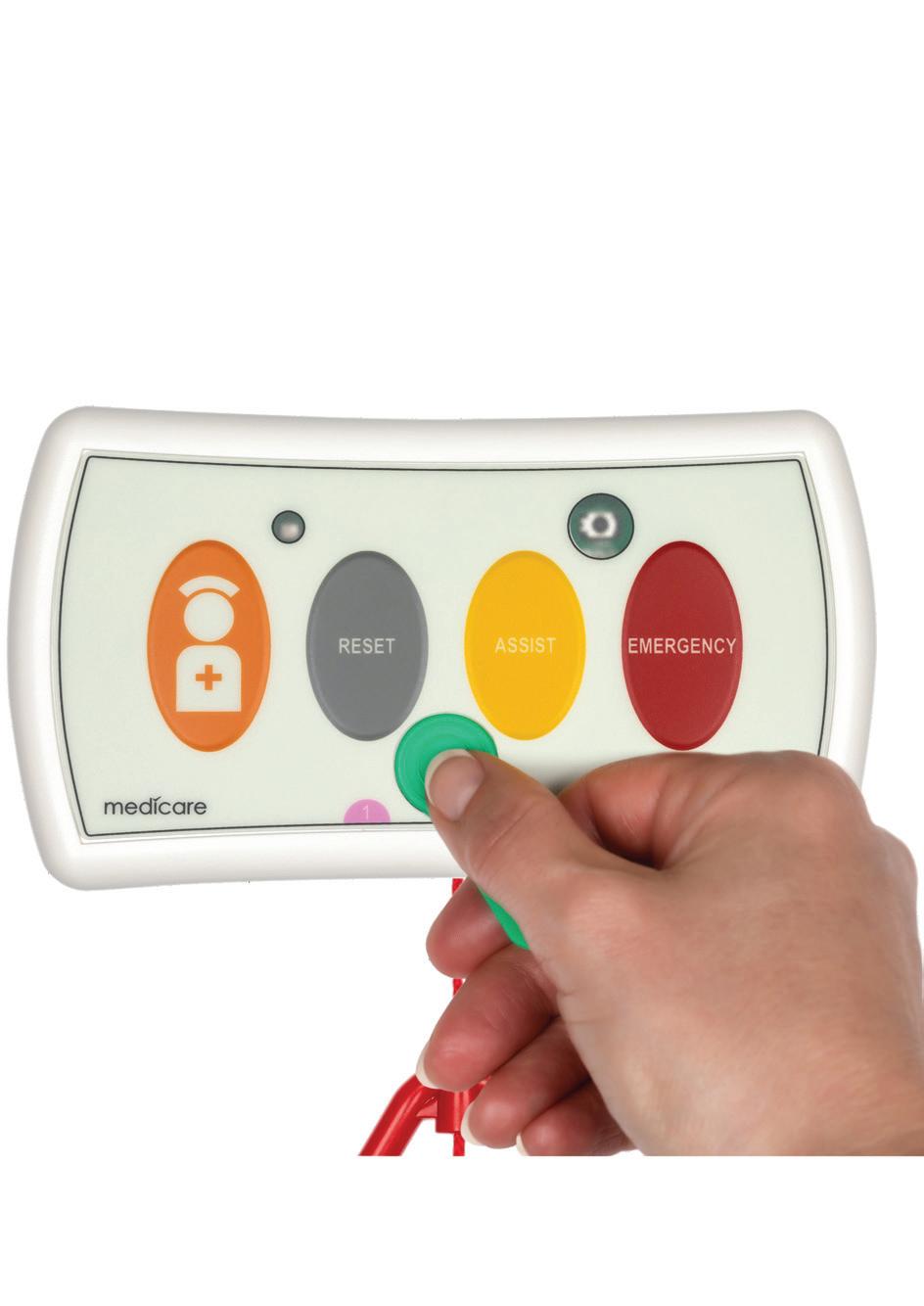


HC-One’s Windsor Court Care Home in Wetherby celebrated resident Joan Simpson’s 100th birthday. Surrounded by family, friends and the team, Joan enjoyed a day filled with joy, laughter and heartfelt memories. The home’s Garden Room was transformed into a vibrant party space, adorned with colourful balloons, festive decorations and a specially prepared buffet. A birthday cake took centre stage, ensuring the event was special and memorable. Joan was overjoyed to receive a card from His Majesty the King in recognition of her 100th birthday. The presence of her family made the occasion even more special, allowing her to share stories, laughter and precious moments with her loved ones.

A resident at Royal Star & Garter in Surbiton has marked her 100th birthday. Maureen Smith enjoyed a party with family, friends and other residents at the Home. In 1941, at the age of 15, she went to work at the Hawker factory in Kingston, which helped design and build the iconic Hurricane aircraft that played a crucial role in the Battle of Britain. Maureen worked at Hawker’s until 1953, before becoming a full-time mum. She later worked for the Inland Revenue in Hinchley Wood and New Malden. Maureen enjoyed a lunch with her son Quentin, his wife Christine and niece Jacqui before friends joined her for live music entertainment from piano and singer duo The Totties.
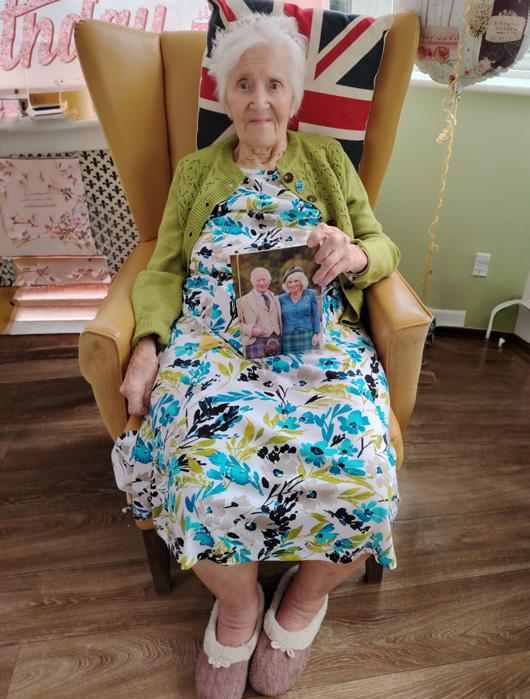
The Rowans Care Home in Macclesfield, part of Canterbury Care, was filled with joy and laughter as residents, staff, and family gathered to celebrate the 101st birthday of resident Joyce Shatwell. Born in Bradford, Joyce has lived a remarkable life. During World War II she worked as a machinist, before pursuing her passion as a dressmaker and seamstress. Joyce met her late husband Eric in a chance encounter on a train during the war. They married when Joyce was 26 and shared 44 happy years together. Despite Eric’s passing, Joyce continues to be surrounded by the love of her family, including younger sister Betty, now 99 years old. To mark her milestone birthday, The Rowans hosted a lively celebration, with friends, family and the Mayor of Macclesfield joining in to wish Joyce well.
Croft Lodge, part of Centrum Care Homes Group, celebrated the 100th birthday of Ethel Mould – known as Kathy – with a party filled with music, food and family. The celebration brought together Kathy’s loved ones from across the country, with relatives travelling from far and wide to mark the milestone. Team members, residents and guests gathered in the lounge at Croft Lodge, which was transformed for the occasion with live music, a buffet and a birthday cake. Kathy, who served in the Women’s Land Army during World War II, is known for her kindness, wit and stories. Following the war she dedicated her working life to caring for others as a healthcare assistant in hospital settings.
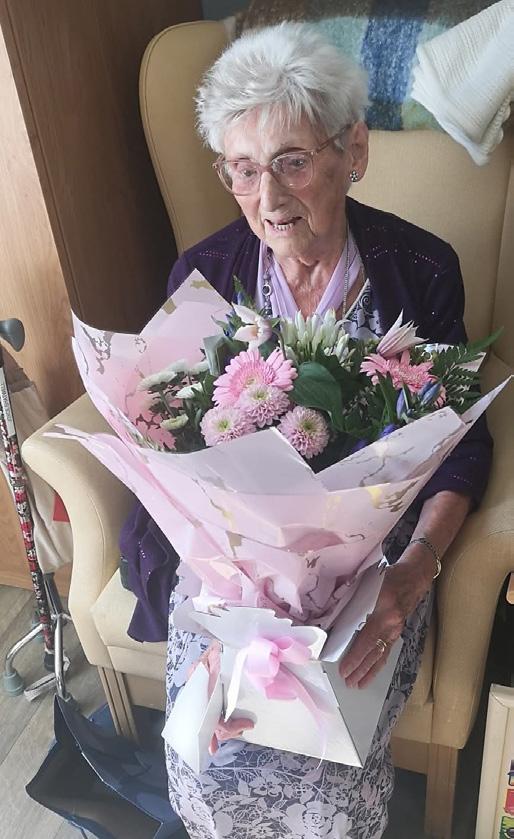

Muriel Lindars, known as Eva, celebrated her 102nd birthday at The Rowans in Macclesfield. Eva was born in St Mary’s hospital in Manchester in 1923 and grew up in the city. She worked as an office junior at aircraft engineering company Metropolitan Vickers during World War II. She met her first husband Henrik, a Polish serviceman, at a dance at the Ritz in Manchester and the couple married shortly after. They had one son, Tony, born in 1945. Eva and Henrik were married six years. Eva has worked many jobs, her favourite being at Baguley Hospital in Manchester where she worked as a medical secretary, and met her second husband David, a doctor. David was offered a job in Dagenham, Essex so they relocated together. They were married for 18 years before David died in 1973. The couple have two daughters, Christine and Helen, who joined Eva for her birthday.
HC-One’s Adelaide House Care Home in Walton-onThames, Surrey, was alive with laughter, cheers and plenty of cake as residents and colleagues gathered to celebrate Eric Shurmer’s 85th birthday. Fondly known as the “Quiz Genius” of Adelaide House, Eric has become a cornerstone of community life. The birthday celebration featured a decorated cake, balloons and a special gathering where residents shared stories and tributes about Eric’s kindness, humour and the friendly rivalry he brings to their regular quiz nights. Colleagues presented Eric with a personalised quiz booklet highlighting questions from his favourite categories – a nod to the countless games he has helped make so memorable.

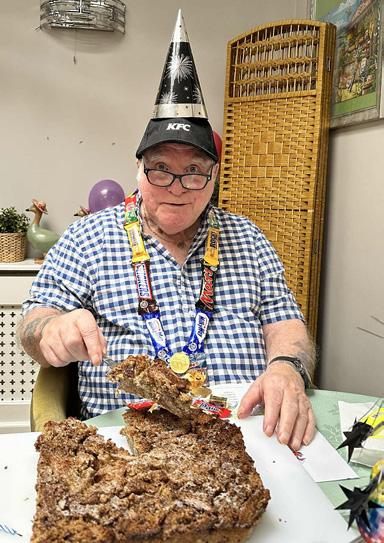
Cecilia Jemitus, a resident at St Helen’s Hall, Merseyside, part of Sandstone Care Group, has celebrated her 105th with a western style party with family and friends. She celebrated her big birthday surrounded by guests in cowboy hats and boots. The team at St Helen’s bought her balloons and a cake with her face on it and received a birthday card from the King and Queen, adding to her collection of royal birthday wishes. Born on Liverpool’s Dock Road in 1920, Cecilia has lived an extraordinary life. One of eight children, she served as a fire warden during World War II, bravely throwing sand over incendiary bombs to protect her community and country during the war. She married Alexander, with whom she had two daughters, Patricia and Anne. After Alexander’s passing when the girls were young, Cecilia devoted herself to raising her family, never remarrying.

A grandfather’s birthday wish came true when staff at his Hampshire dementia care home arranged for him to go on a much-wanted road trip in a VW campervan. John Sulzmann celebrated his 75th birthday in the fresh air of the New Forest after journeying from Colten Care’s Winchester home St Catherines View. Along with fellow passengers – his wife Veronica and the home’s Companionship Team leader Laura Sheldrake – John was able to sit back and enjoy the ride to and from Whitefield Moor near Brockenhurst. Once there, he took in the countryside views and, with the side door open, had a picnic with Veronica as they sat together.





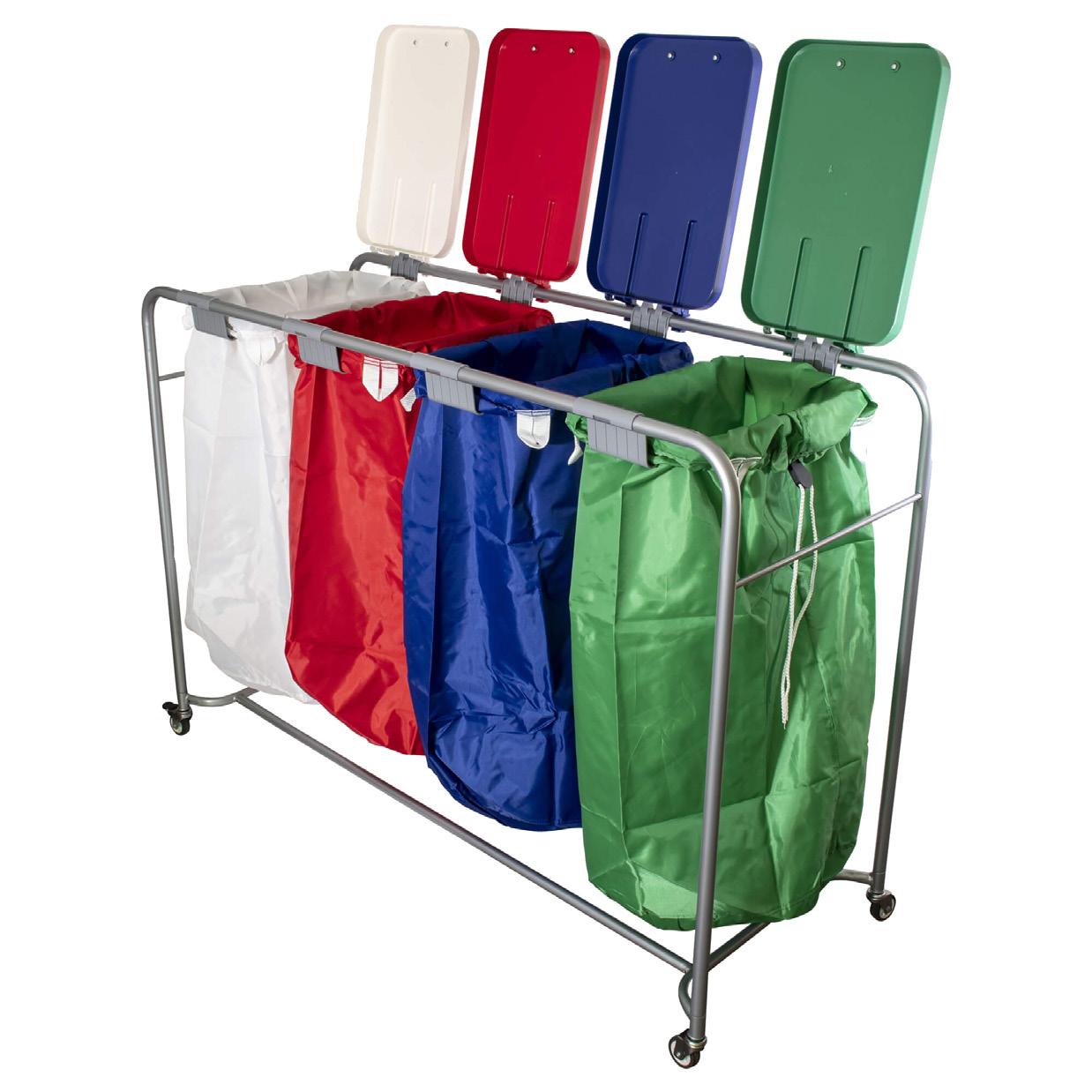

SKILLS for Care provides guidance and support to leaders in adult social care in a variety of different ways.
One of our key offers of support is our networks for leaders and managers; each have different focuses depending on the needs of the role of those attending, but all our networks provide opportunities for peer support, reflection, and discussion of best practice with like-minded professionals.
Whether they meet in-person or virtually, Skills for Care network meetings give you the opportunity to connect with other people in your role (or in equivalent roles), to share your experiences, to discuss your successes, best practice and challenges with peers outside of the context of your service, and to foster a sense of professional identity through these connections.
Each meeting is attended or led by Skills for Care locality teams, who are available to share information about regional and national initiatives from Skills for Care, signposting you to information relevant to your needs.
Our networks often include guest speakers from other organisations, including the Care Quality Commission and the Department of Health and Social Care.

Why should you join a Skills for Care network?
There are many reasons to join one of our networks, including:
n To feel more supported and less isolated in your role.
n To stay informed about sector developments and best practice.
n Have the ability to ask questions and get answers in a safe, supportive environment.
n To take ideas, top tips and learning back to your service.
Our 2024/25 survey of registered manager and deputy manager networks found that 96 per cent of respondents recommended joining one of our networks.
Registered manager networks
There are more than 130
registered manager networks, with at least one available to managers operating in every local authority area in England.
Most registered manager networks meet three times a year, with a mix of in-person and virtual meetings taking place depending on the locality and needs of the network.
Many of these networks are coled by local registered managers, and all registered manager networks aim to reflect the interests and concerns of those who attend by providing a space for local managers to talk about their issues and challenges.
Local networks feature regular attendance by local or regional guest speakers, whether from the local authority, representatives
from CQC teams, from the Integrated Care System, or other sector voices.
Deputy manager networks
Skills for Care runs six deputy manager networks with virtual meetings taking place three times a year.
These regional networks, facilitated by Skills for Care locality managers, provide those in the deputy, aspiring manager or team leader role with a detailed look at key topics both relevant to their current practice but also supporting their development as a leader and manager in adult social care.
Nominated individual and CEO networks
Skills for Care runs several regional networks that provide support to nominated individuals, CEOs, or to senior leaders from both groups, covering all of England.
These networks, facilitated by Skills for Care locality teams, offer peer support and a safe place for collaboration with other strategic leaders in each region, and a place to discuss the implications of national, regional and local strategies and opportunities for providers and their workforce.
Find out more about our dedicated networks to support leaders and managers at www.skillsforcare.org. uk/DedicatedNetworks
By Neil Grant Introduction
On October 216, 2025 the Care Quality Commission published its consultation on proposed changes to the way it assesses and rates health and social care providers. It is called ‘Better regulation, better care’ and the public have until 5pm on December 11 to respond.
Context
It is almost five years since CQC issued its last consultation on proposals for a more flexible and dynamic regulatory framework.
The consultation back in January 2021 was ambitious and groundbreaking as it proposed a move to a system of real time regulation based on ongoing data collection and analysis.
CQC said at the time that it would not always be necessary to carry out inspection visits if it wanted to update ratings. Unfortunately the implementation of this strategy after December 2023 – known as the Single Assessment Framework – was spectacularly unsuccessful. CQC acknowledges the failures in the new consultation. It is time to move on.
Key proposals
In many respects, CQC is proposing to go back to what it was doing before the introduction of the SAF. Key proposals are:
1. Reintroducing assessment frameworks that are specific to each sector with supporting guidance. The supporting guidance will show “the key standards and sources of evidence that we will consider for the
services in that sector.”
2. The assessment frameworks will be simpler and clearer. CQC proposes to abandon scoring altogether under the five key questions: safe, effective, caring, responsive and well-led.
3. Replacing the quality statements with what are called “supporting questions” which will be similar to the previous Key Lines of Enquiry.
4. Re-introducing rating characteristics for each rating: outstanding, good, requires improvement and inadequate.
CQC says the inspectors will carry out a “rounded assessment of evidence with reference to ratings characteristics.”
Types of inspections
Two types of inspections are referenced in the consultation:
n Routine planned inspections, “where we plan to take a broad and detailed look at the quality and safety of the services.” These would generally be carried out on a threeto-five-year cycle.
n Rapid response inspections, “where immediate and specific concerns are identified. Inspectors will be deployed to understand the nature and significance of problems and will focus on areas of particular risk.”
CQC says, “We would not expect to look comprehensively at every area of every service or cover every part of the assessment framework every time we inspect a service. However, we would expect that routine planned inspections would normally cover all of our five key questions, so that we
fully understand the quality of the service across the framework before updating our overall ratings.”
CQC adds: “When updating our ratings, we intend to minimise the mixing of new evidence with evidence gathered in previous inspections, especially where those inspections were carried out several years previously.”
This statement shows a lack of appreciation of the need to rate services based on the position at the point of inspection. It should not be based on previous evidence from an earlier inspection at all.
One of the major weaknesses of the current regulatory framework is the absence of a defined frequency of inspection.
As a result, services can go many years without having a CQC inspection. CQC says, “we intend to introduce a frequency schedule for individual health and care sectors that takes into account previous ratings and other factors such as emerging risks.” This is to be welcomed. Indeed, it is a legal requirement which CQC has ignored for years.
Current inspection reports are often vague and confusing. CQC says, “For providers, we want our inspection reports to provide detail of our judgements and support them to identify areas for positive change and continuous improvement. We recognise that providers need detail in our reports to understand why they have received a particular
rating and to relate to other providers.” Again, this is welcomed.
Most CQC inspectors carry out their duties in a professional and dignified manner.
However, at Gordons Partnership we do come across cases where individual inspectors fail to uphold the high standards expected of them. Therefore, the commitment on the part of CQC to ensure there are professional relationships with providers based on respect and trust is welcomed.
As CQC says, “however good our regulatory model, standards and processes are, our impact depends crucially on the people who implement and experience our regulation. We aim to ensure that we consider the impact of our work on the providers that we regulate, including the wellbeing of their staff.”
Conclusion
CQC’s consultation is high level and modest in its aims. That is a good thing. Reverting back to the model that was in place before December 2023 is sensible and obvious. No doubt improvements can be introduced to it along the way.
CQC says it is committed to testing everything properly first. Sadly that didn’t happen with the SAF. We have had too much drama in the past two years. Please, CQC, get it right this time around for all our sakes, most importantly for the people who use services and seek assurance about their quality and safety.
n Neil Grant is a Partner at Gordons Partnership Solicitors.

A GROUNDBREAKING new documentary aiming to change perceptions and drive change for the UK care sector is set to be screened to MPs and government officials this November.
CARE, a film focusing on the day-to-day lives of care home residents and workers, is set to be screened at Westminster on Monday, November 17 following a successful nationwide tour.
Filmed entirely by staff at a North East care home as it emerged from the Covid19 pandemic, CARE gives a glimpse into the dedication and compassion of the workers that look after some of the most vulnerable people in society, while raising crucial questions about whether there is adequate support for those who bring such commitment and heart to the sector.
The film’s Westminster screening, which follows the beginning of the government’s long-anticipated Covid enquiry, aims to shine a light on not only the commitment of care staff, but the realities of working in a sector that is overlooked and underfunded.
Hosted by Danny Beales, the Labour MP for Uxbridge and
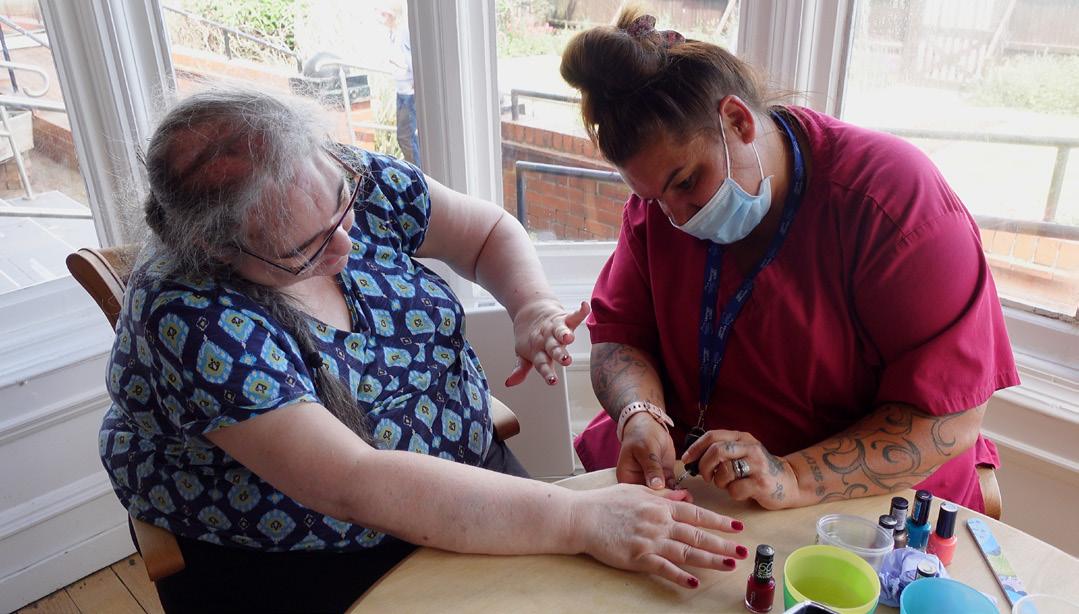
South Ruislip and member of the Health and Social Care Committee, the event will be attended by key MPs, policymakers and senior leaders from the care industry, and will feature the real experiences and voices of care workers who have been at the frontline during Covid and beyond.
The screening aims to spark meaningful conversations around the importance of respecting and supporting the care sector, and act as a catalyst for real policy change benefitting care workers across the country.
During the recent successful nationwide tour of CARE,
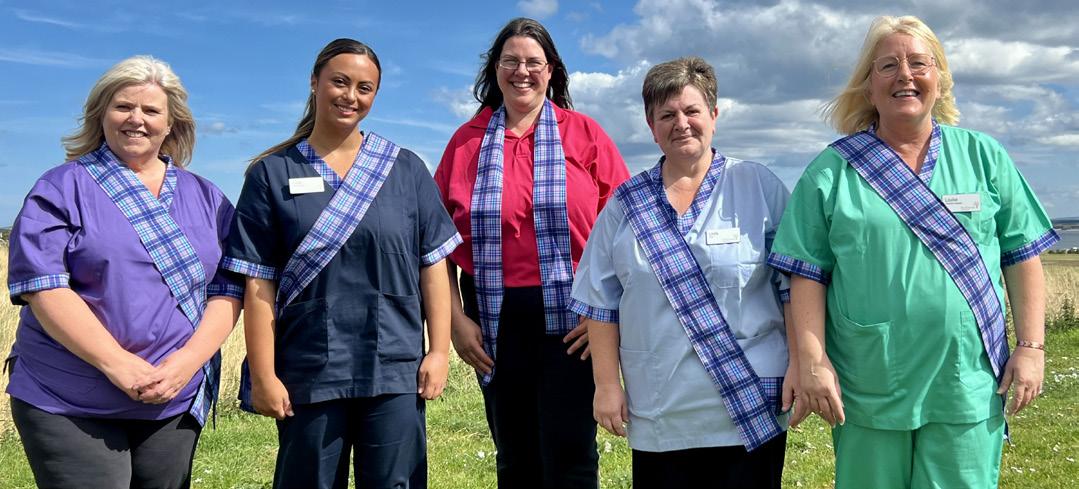
PARKLANDS Care Homes has unveiled an official tartan – the Colours of Care – celebrating the vital contribution each member of its team makes to the delivery of care.
Created by Highland artist Liz Peck, the tartan draws inspiration from the colours of uniforms worn by care workers – weaving together green for domestic staff, pale blue for carers, dark blue for nursing staff, deep purple for team leaders, and pink for wellbeing coordinators.
Ron Taylor, managing director of Parklands Care Homes, said: “This tartan is more than just a uniform. It’s a celebration of the compassion, teamwork and commitment that run through Parklands.
“Every thread tells a story
of care, with each shade representing the vital role that every member of our team plays in supporting our residents. I’m grateful to Liz for her work in bringing the Colours of Care to life, and it’s wonderful to see the tartan become part of everyday life for our staff.”
The design began life as a sculpture for the Highland HeArt Trail, a fundraising initiative for Highland Hospice, before being translated into cloth.
The tartan has now been adopted as the pattern for Parklands’ new staff uniforms and is being rolled out across its care homes, giving the organisation a distinctive new look that highlights the diversity of its roles and the importance of every team member.
panellists and audience members spoke candidly of their experiences, as well as how the film shines a light on the reality of care work.
Olivia Firth, policy and project manager at the Care Workers Charity, said: “It presented a lot of the joys of [care work]. One of the things that we used to say when I was in care work is that there was always beauty in the mundane.
“Even if you were doing nothing, you could find something beautiful with the person that you were caring for or supporting.
“I also think [the film] points to the fact that care work is essential and care workers are
essential. They are vital and they are valuable.
“One of the biggest things for care workers, apart from the lack of recognition and the lack of pay, is the lack of consistent, adequate mental health support available to them, especially in the aftermath of Covid, with that individual not being able to speak about their experiences – that is still ongoing for a lot of care workers.”
The film was produced by Newcastle University, in association with Tongue Tied Films, released with the support of the ESRC, and in partnership with Community Union, British Gerontology Society, Care England and Cosmic Cat Films.
The release of CARE is supported by an ESRC IAA grant and Newcastle University.
Alastair Cole, director of CARE, added: “Bringing the film – and the voices of the care staff it represents – to Westminster has been a key goal for our whole project team, so it’s incredibly exciting to see it happening.
“The film’s journey around the UK has been both heartening and inspiring, as we’ve met care professionals and listened to their stories and responses.”
A STAFFORDSHIRE care home is celebrating a five-star food hygiene rating following an inspection by the Food Standards Agency – having opened its doors recently.
Wyrley Rose, Macc Care Group’s newest state-of-theart care home in Great Wyrley, alongside its on-site Haven Café, have been commended for their dedication to upholding exceptional standards in food hygiene, safety and quality.
The Haven Café, located at Wyrley Rose, offers a warm and welcoming space for residents, families and members of the local community to enjoy a selection of freshly prepared meals, snacks and drinks.
The café forms a key part of the home’s hospitality offering of promoting independence, social connections and choice for its residents in everyday life.
Bhav Amlani, director of Macc Care Group, which operates 16 care homes across the Midlands, added: “We’re incredibly proud of the team at Wyrley Rose and at the Haven Café for this fantastic achievement.
“The five-star rating is a reflection of the ongoing commitment to excellence in both food hygiene and delivering a

warm, restaurant-style experience that our residents, their families and the wider community can enjoy. It’s another important milestone in establishing Wyrley Rose as a true home from home.”
Beyond the café, the home also offers a high-quality, residentfocused dining experience within its main restaurant spaces.
With nutritious meals freshly prepared on-site each day, the menus at Wyrley Rose are carefully designed to cater to individual tastes, dietary needs and clinical requirements –including options for residents living with conditions such as diabetes, dysphagia and dementia.



Now in its 25th year the regional care conferences organised by Caring UK and Script Media continue strongly to deliver national speakers and exhibitors to local areas for proprietors, managers, financial directors, individuals working within purchasing departments, matrons and senior nursing staff of care homes, nursing homes, dual registered homes, retirement villages, ancillary care organisations and domiciliary care agencies who work in the independent elderly care sector.







Professor Martin Green OBE, Chief Executive, Care England


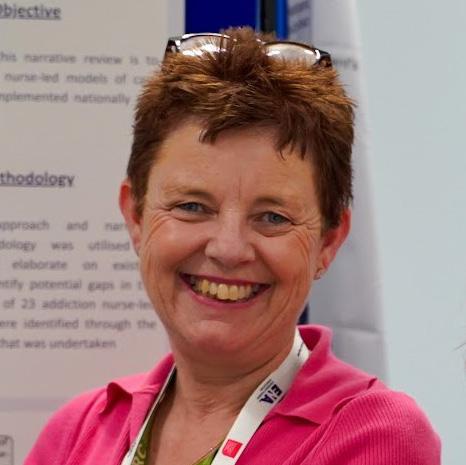
Michele Board, Associate Professor Nursing Older People and Co-Lead Ageing and Dementia Research Centre - Bournemouth University




Samantha Burges, Senior Associate Gordons Partnership Solicitors













FOUNDATION Partners and Deer Capital have acquired five fully operational homes across Kent from The Graham Care Group, in a move which takes their total investment to over £300m in the last 12 months under the Hartford Care brand.
The sale reinforces Hartford Care’s ambitious expansion strategy and adds a further 513 bedrooms to its growing portfolio which now comprises 29 homes in the UK (more than 1,800 bedrooms).
Kevin Shaw, chief executive of Hartford Care, comments:
“The acquisition of these homes from The Graham Care Group represents another exciting milestone in our growth plan and marks our geographical expansion into Kent for the first time.
“It enables us to offer our expert care and ‘home from home’ environment to even more residents in new communities.
“We’re proud to carry on the legacy of Graham Care Group’s expertise and are working closely with the team to ensure a smooth transition as we bring the homes into the Hartford Care family.”
The purpose-built homes acquired are Cornford House and Hazeldene House in Pembury, Woodchurch House in Ashford,
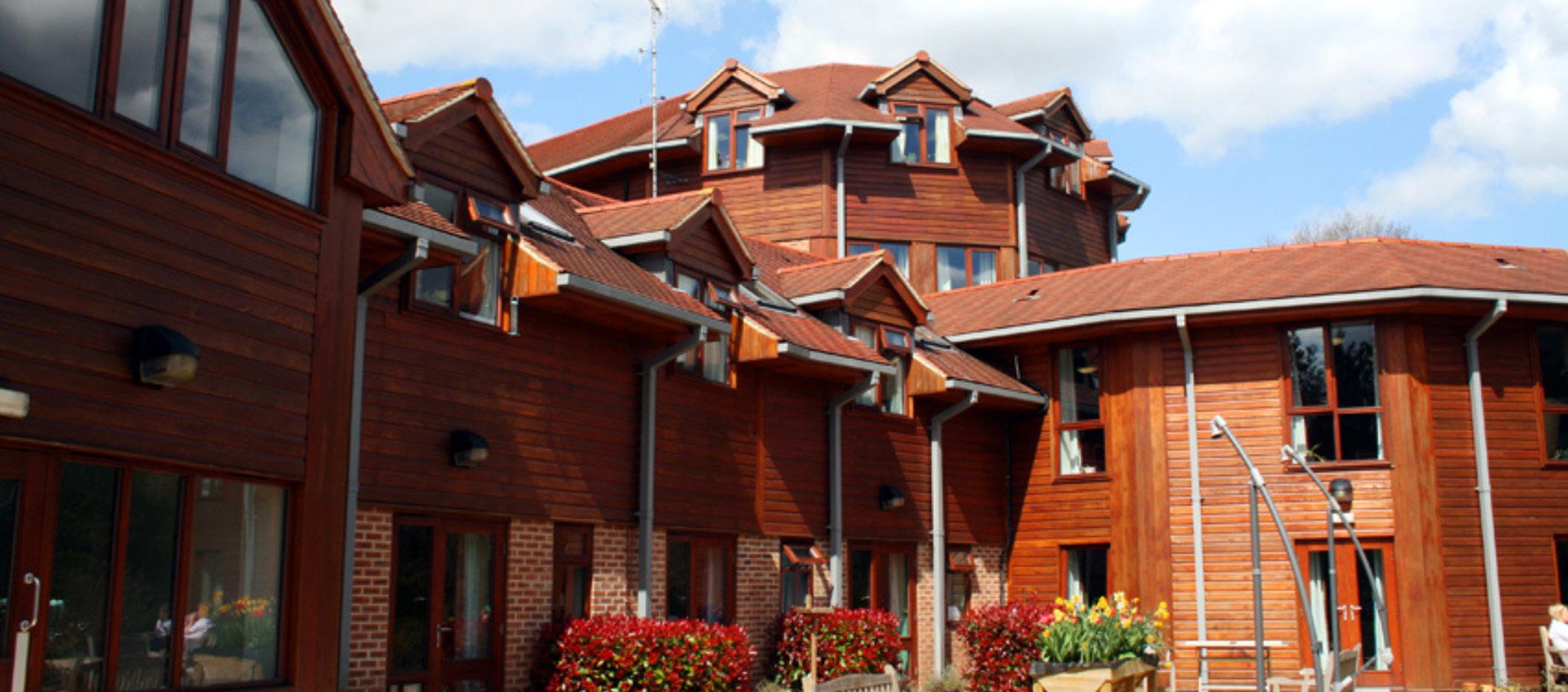
Hawkinge House on the outskirts of Folkestone and Hawkhurst House in Hawkhurst.
The homes have a current occupancy in excess of 95 per cent, reflecting the high quality of the service and environment on offer to residents; the experienced and valued staff in every home will be retained.
All the homes offer studio and one-bedroom suites, which include a kitchenette, living and dining area.
These provide a home for life for residents with nursing
needs, while Hawkinge House and Hawkhurst House include a Proactive Assessment Unit, offering hospital discharge patients access to primary assessment and treatment capabilities. n innovative short-term unit, for those requiring rehabilitation before returning home.
Ernie Graham, founder and owner of The Graham Care Group, added: “Hartford’s philosophy of care for the entire local community in which each home is based aligns closely with
our own.
“This ethos is evident across their homes and in the expert support and care their residents receive.
“We’re looking forward to continuing to collaborate with the Hartford Care team during the acquisition period and wholly supporting our staff, residents and families through a seamless handover while we continue to operate in other areas of the South East running our existing homes and developing new ones.”
CHESHIRE-based Muller
Property Group is reporting increased activity in the new build care home market where it works to unlock sites for development.
The company currently has over 2,800 care beds in the pipeline.
Since January this year it has secured four planning approvals representing 310 new care beds and has also completed seven new care home site acquisitions representing a further 507 new care beds.
The care home market was widely reported as stagnating during the post-Covid years, however, transaction volumes increased in 2024 with this trend continuing into the current year.
Muller has continued its strategic focus on the care home market throughout this time. With a rapidly ageing population

and the NHS’s stated aim of more care being delivered in the community, experts are predicting a huge shortfall in availability of care home beds in
the next 10 years.
Knight Frank predict that the sector will reach full capacity as early as 2033.
Managing director of Muller’s care division, Julie Doherty, said: “We need a significant increase in quality care home beds to meet our ageing population’s needs.
“In the recent years we have seen a drop in registrations of new care homes which is concerning, due to the closure of older homes, we need to see more new care homes.
“Over the past 12 months we have seen an increased appetite from funders, developers and operators which is helping to drive growth in the market but there is clearly a way to go to meet the increasing demand.
“With positive signs on the investment front, more flexibility
is required in the planning system to super-charge new registrations of homes that are designed and built to meet current needs and those of the next twenty years.”
The ageing population will mean that more people are living with multiple, complex conditions, including various forms of dementia.
The care home of the future needs bedrooms with en-suite facilities and communal spaces.
Much of the existing stock, built in the 1960s and 70s lacks modern amenities.
Julie added: “There is a real opportunity to help re-shape the future of care provision and we are working with care home operators, funders and investors and our development partners to deliver these much-needed modern facilities.”




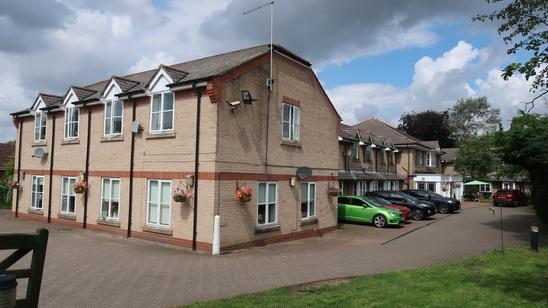


East Yorkshire Care Group has doubled in size after acquiring The Old School House in Brough (42 beds) and Orchard Court in South Cave (43 beds).
Bradley Birmingham now leads operations and thanked Lamont Johnson’s Grayson and Dawn for their support.



Lamont Johnson has completed the sale of Highborder Lodge in Stonehouse, Gloucestershire
The 40-bed home, a period property with a modern extension and all ensuite rooms, was sold on behalf of the Thorne family to John Westmore of the Jammac Group
Kimbolton Lodge, a 36-bed “Good” rated nursing home in Bedford with 16 ensuite rooms, has been sold to an experienced regional operator expanding their portfolio.


The 30-bed home, a period property with sea views and 29 ensuite rooms, was sold on behalf of Richard and Elizabeth Fraser to local operator Denver Rajaratnam of SLR Care Homes Ltd.



OAKLAND Care has expanded its memory care floor at Elmbrook Court in Wantage, Oxfordshire.
The investment forms part of the operator’s strategic approach to care which involves a frequent review and comprehensive efforts to enhance its home’s environments.
Manager Rebecca Warman said: “Over the years we have seen a real rise in demand for our memory care environment and wanted to make a conscious effort to invest and expand our memory care floor with new highquality space.
“This exemplifies the efforts which have been made across Oakland Care to continually invest in our care homes so that we can always offer the highest quality professional care provision and accommodation.
“As Elmbrook Court has grown over the years it has been vital that we have not only maintained the high standards we are known

for at Oakland Care but also respond to local demand as it arises.”
The additional space comes in response to growing local demand for its memory care environment at Elmbrook Court, with the original space, known as Birch Avenue, at full capacity.
Memory care environments are designed to be relaxing, safe and
familiar, incorporating elements that reduce confusion and worry while promoting independence for individuals living with dementia or experiencing memory loss.
In response, the team have invested in the creation of a second memory care space, which will be known as Cedar Crescent.
This has seen a 28-room area
of Elmbrook Court enhanced with additional quiet, calm and sensory based features for current and new residents seeking this type of care.
Alongside the purchase of an interactive and adjustable ‘magic’ tablet device for residents, the expanded memory care floor has included the incorporation of nostalgic elements which residents may have experienced in the past, wayfinding décor, sensory touch patches designed to bring comfort and physical engagement, and more.
Through the process, improvements have also been made to the original Birch Avenue space to enhance the overall memory care offer at Elmbrook Court.
An event to mark the expanded memory care floor was attended by the Mayor of Wantage, Iain Cameron, alongside team members, residents, families and other members of the public.
LOVETT Care has completed the acquisition of Belvedere Manor Care Home in Colne, Lancashire from Methodist Homes Belvedere Manor is a purposebuilt facility offering 84 en-suite bedrooms and specialising in residential, dementia and respite care. The acquisition marks another significant step in Lovett Care’s growth strategy, expanding the group’s portfolio to 27 operating homes across the North West, Midlands, and Wales, with several more currently in development.
The operator has plans to continue investing in the home and ensuring residents, families and staff benefit from the group’s ethos of exceptional care and
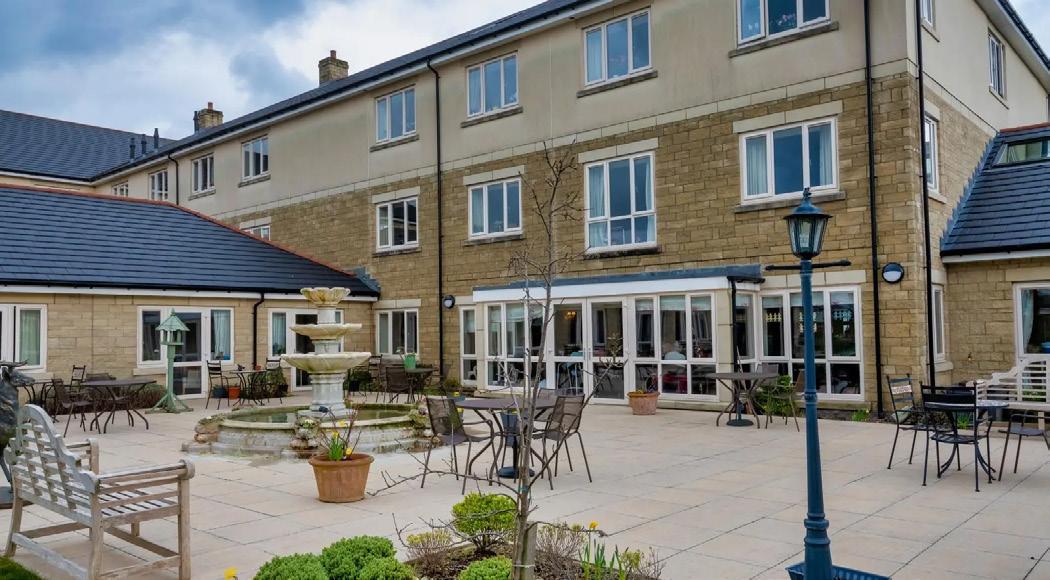
community engagement.
CEO Keith Crockett said: “We are delighted to welcome
Belvedere Manor, its residents, families, and dedicated team into the Lovett Care family.
“Our priority is to provide continuity and reassurance, while also looking ahead to opportunities to enhance the home and build on its existing strengths.”
All existing employed staff at Belvedere Manor will transfer to Lovett Care, ensuring consistency of care and familiar faces for residents and their families.
Dan Ryan, deputy chief executive and director of operations at MHA, added: “We are delighted that Belvedere Manor care home will pass into the hands of Lovett Care, where we know residents and the team which cares for them will be well looked after.”
WORK is underway on the development of a new £14million care home in Broughty Ferry, Dundee, following an official sod cutting ceremony attended by committee convener Councillor Steven Rome.
The 54-bed facility is being developed by Meallmore, and is designed to support older people with a variety of age-related health conditions, including frailty and dementia.
The new care home will provide approximately 70 full-time equivalent jobs in the local area, including nurses, care assistants, administrators and managers. Michael Gillespie, property director for Meallmore, said: “This new home has been designed to offer the highest quality facilities

for residents, while empowering them to maintain their desired levels of independence.
“Set in a beautiful spot in Broughty Ferry, this home is going to be a lovely place to live. We’re excited to see the development progress and look forward to welcoming residents.”
Estimated for completion in early 2027, the three-storey home has been sensitively designed to complement the surrounding area, minimising encroachment on the established gardens and ensuring the building is in-keeping with the residential character of the area.
The bedrooms will be arranged in small group living units, with upper floors featuring outdoor terrace spaces and the ground floor providing access to private garden areas. Inside, the care home will offer a cinema, café, private dining room and beauty salon.
The construction work is being undertaken by CHAP Group.
Paul Matthew Dundee area construction director at CHAP Group, added: “We’re thrilled to be working with Meallmore to deliver this new care home, which will provide first-class facilities for residents.
“We look forward to working with Meallmore, the design team and wider community as we deliver the project.”

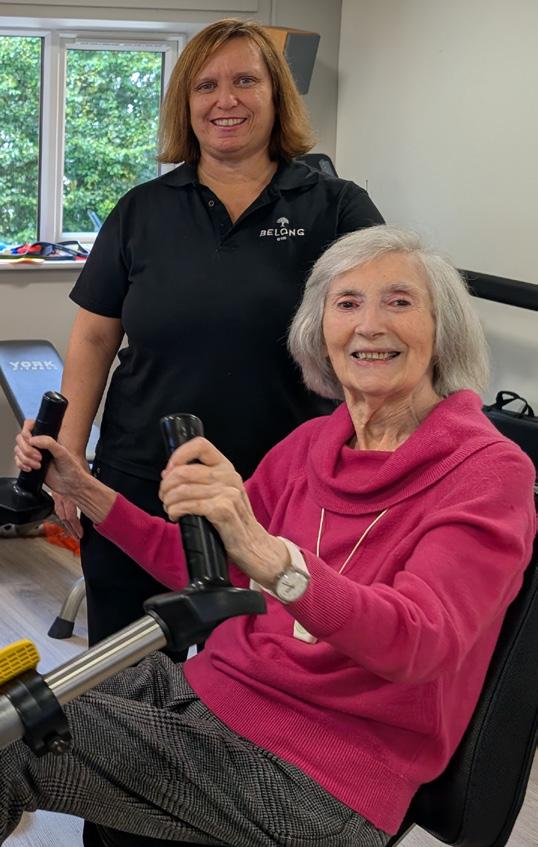
Laura Clegg has been appointed as commissioning manager for Sandstone Care Group’s newest luxury care home, Manor Park in Old Malton, which is set to open soon. A registered nurse with more than 40 years of experience, over half of which has been dedicated to adult social care, Laura brings a wealth of knowledge and leadership to her new role. Her career has spanned a variety of positions, from hands-on care to operational and regional leadership, but her enduring passion has always been in delivering outstanding quality and outcomes for the people she supports. Most recently, Laura completed a Master’s in Advancing Healthcare Practice, reflecting her strong belief that continual learning directly contributes to raising the quality of care.

Barbara Tait has been appointed as lead exercise specialist at notfor-profit care operator Belong, heading up the group’s awardwinning, in-house exercise provision responsible for remarkable outcomes for older people. Highly qualified and passionate about her vocation, Barbara was part of the team behind Belong’s fitness and wellbeing strategy having successfully developed the vision for the organisation’s launch 15 years ago. She returns to the post following a stint volunteering in disaster relief in her native South Africa. The pioneering approach to dementia care sees exercise specialists like Barbara devise personalised fitness programmes to complement customers’ care plans, also linking with external ancillary services, such as NHS health practitioners, physiotherapy and rehabilitation.
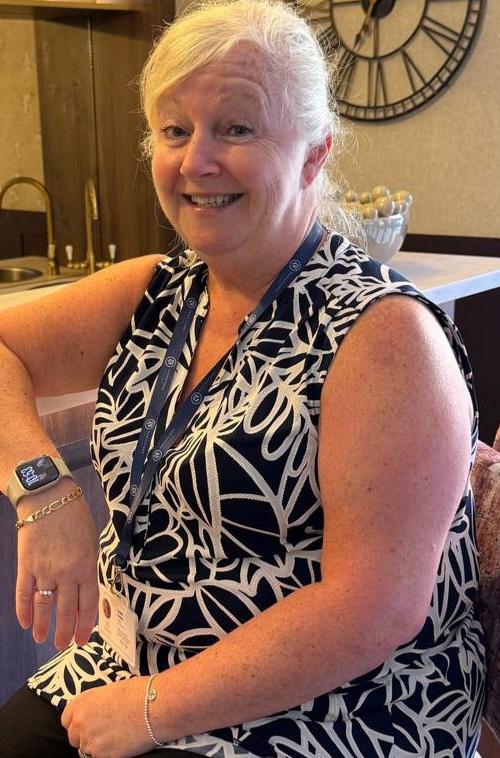
A Yorkshire based social care group has announced the appointment of Rob Harrison as its new head of estates and health and safety. He has been with the organisation since 2016, will now lead the estates department and take overall responsibility for the Group’s health and safety operations. In his new role, Rob will oversee the delivery of maintenance, decoration, grounds care and project works across all HICA sites, as well as ensuring statutory requirements are consistently met. He will now lead a team responsible for ensuring HICA’s homes and services remain safe, modern and welcoming. Rob will also champion ongoing improvements in health and safety standards across the organisation. He joined HICA as a maintenance supervisor at Buckshaw Retirement Village before progressing to estates support manager.
Belong at Home has appointed Debbie Moore to head up its Merseyside debut as the not-forprofit dementia specialist gears up to launch in Southport later this autumn. Debbie will be responsible for leading a team of dedicated support workers assisting older people in homes throughout the area, providing one-to-one personal care, housekeeping and food preparation, as well as running errands, helping with excursions and offering companionship. The experienced senior carer is promoted from Belong at Home’s Wigan team for the expansion, bringing with her more than two decades of knowledge, experience and awards with her. Since joining the team more than 20 years ago, she has advanced her expertise whilst achieving an NVQ Level 5 in Health & Social Care.
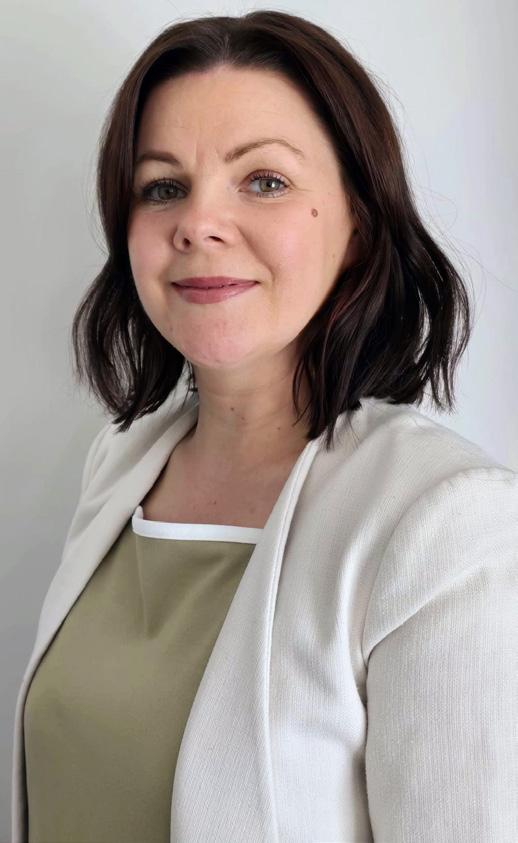


Dunham Care has announced the appointment of Mike Wilson as chief operating officer, as well as Trisha King, who has been appointed registered home manager of Herne Bay Manor in Kent. With more than 25 years of transformational leadership in healthcare, Mike joins the executive team at a pivotal moment in the organisation’s growth journey, bringing a wealth of strategic and operational expertise. As COO he will play a critical role in shaping Dunham Care’s next phase of expansion, with a focus on delivering future-ready, high-quality care environments that reflect the group’s luxury care philosophy. Trisha brings more than 40 years of experience in health and social care, with an extensive background as a registered general nurse, care home manager, commissioning manager and regional director.
Lovett Care has appointed Sharon Oldfield as home manager at Fairfax Manor, a new, state-of-the-art care environment in Harrogate. Well qualified, Sharon has worked in both the NHS and social care sector since 2009 and was more recently manager at a Yorkshire care home where she and the team achieved an Outstanding rating from CQC. Sharon holds a Level 5 Diploma in Leadership and Management in Social Care and has been recognised both regionally and nationally with award wins. In her new role she is looking forward to meeting all residents and their relatives, getting to know them personally, and is committed to building on the strong foundations already in place at Fairfax Manor, ensuring it continues to flourish.
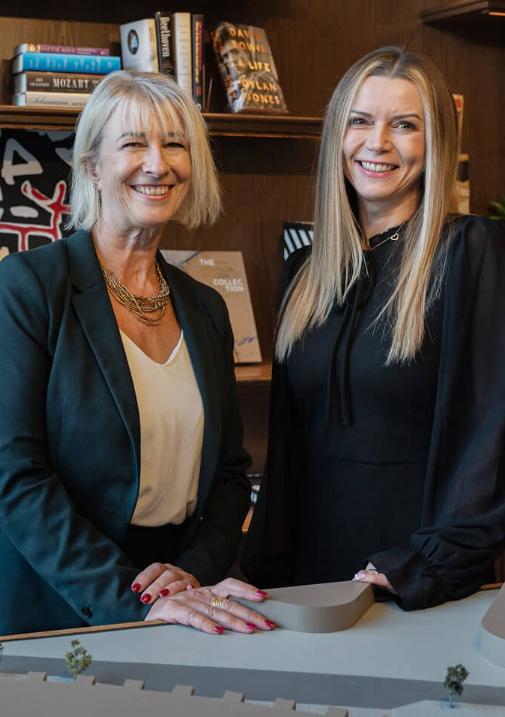
Live-in-care provider Oxford Aunts has appointed a new managing director to drive excellence across the business and grow its client base in Oxfordshire and the surrounding areas. Paul Gibbs joins the organisation after five years with another care provider, where he held both field and head-office leadership roles focused on service delivery and customer experience. Earlier in his career he served as an area manager in the charity and retail sectors, developing practical expertise in multi-site operations, workforce management and quality assurance. Paul’s approach to care is informed by personal experience: a parent living with dementia. This shaped his view of what families require from a home care provider.
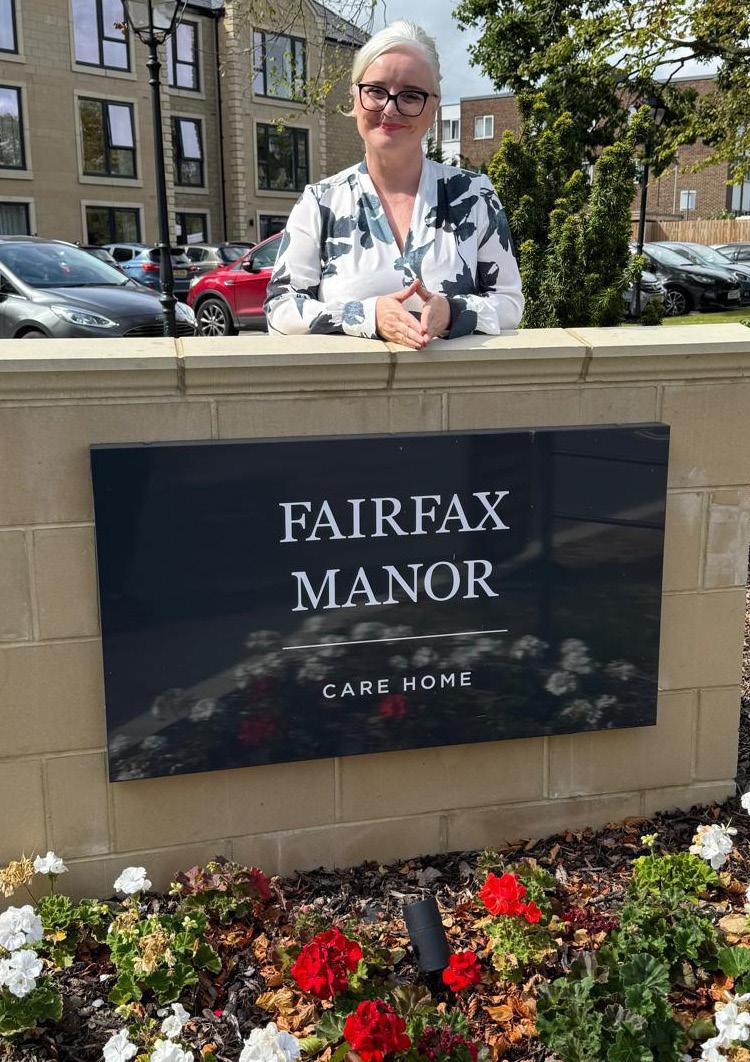
Integrated retirement community operator Wallacea Living has announced two further appointments. Maggie Lopez joins as a registered care manager and Julie Wood as the training and development manager. Maggie joins with more than two decades of experience in adult social care. In 2018 she joined Right at Home, where she further honed her leadership and operational skills, managing home care services and ensuring compliance with CQC standards. Julie joins with more than 30 years of experience. A qualified teacher with a background in nursing and care management, she will lead the company’s training strategy, covering everything from onboarding to developing bespoke programmes tailored to service needs.
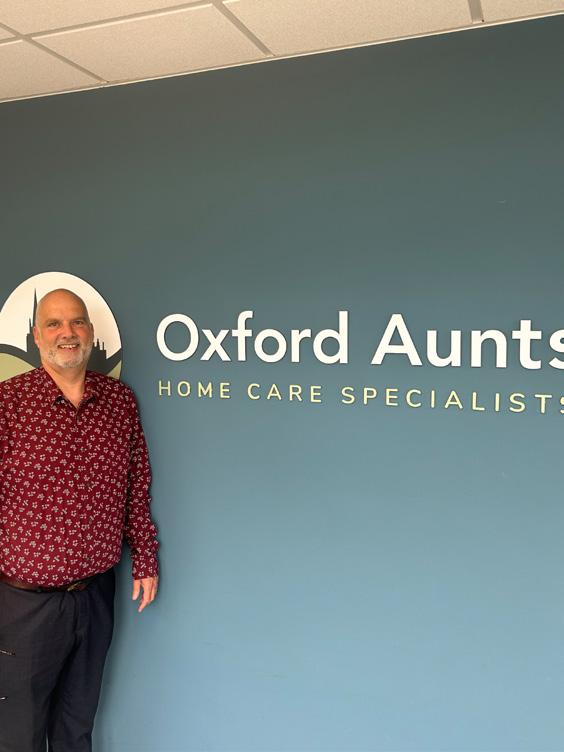


WE’VE just launched our new eco collection – powerful, plant-based cleaning products designed to kick-start your sustainability goals.
From washing up and hand hygiene to floors, toilets and surfaces, you’ll get:
n High-performance plant-based power.
n 100 per cent recycled plastic bottles.
n A ready to use solution – no
complicated dosing. There’s no compromise here – just effective cleaning with a lower environmental impact. With clear labelling and readyto-use formats, it’s simple to switch without changing the way you clean.
Contact Sam Paines at sam. paines@gompels.co.uk for your free samples and product advice. Explore the full Eco range at www.gompels.co.uk/eco
MEDICARE Systems are experts in manufacturing and installing wireless nurse call systems.
Nurse call systems are an essential part of worldwide healthcare.
They provide a way for patients to communicate with staff and for staff to be alerted to patient needs.
Our systems and equipment can be found in nursing homes, hospitals, hospices and clinics worldwide.
Medicare Systems offers a professional service from initial consultation to the installation and commissioning of the nurse call system recommended to the client.
The HTM6500, Medicare’s latest range of wireless nurse call products, has been designed with aesthetics in mind.
While easy to use and highly durable, separate systems are designed to meet the varying requirements of both the private and the public sectors.
With the flexibility to cater to unlimited call points, the HTM6500 system incorporates the best in wireless radio technology.
It remains the most user-friendly radio nurse call system to use and maintain.
The HTM6500iBiR system is a

nurse call system that provides specific data to meet CQC standards.
It allows care monitoring while providing an alarm system to raise the alarm for help and assistance when required.
The HTM6500iBiR system offers versatility and many other options.
The system benefits from being addressable; it not only records response times, but it can also record the staff member who has attended to help and provide care or assistance.
Whatever your requirements, from the smallest to the largest site-wide networked systems, Medicare can tailor to suit your individual needs and budget.
After installation, you will have the reassurance of the Medicare service support team, which is available 24 hours a day, 365 days a year.
Please call our free phone number 0800 849 5123 or visit our website www.medicaresystems.co.uk to arrange a demo or request a quote.
By Richard Woodward
IN RECENT years our responsibility to reduce our environmental impact – as both individuals and businesses – has been spoken about more than ever.
Within the health and social care sector, the Care Quality Commission’s Single Assessment Framework now places environmental sustainability firmly within its criteria for deeming if a service is “well led”.
This includes looking at whether care providers have shown action in areas such as carbon reduction, energy saving measures and waste reduction and recycling.
Despite this quality statement not yet being formally assessed outside of NHS trusts, it’s said it will become part of broader regulatory changes for other services expected to be rolled out soon.
For care homes, this presents a valuable opportunity to get ahead, reflecting a genuine commitment to the wellbeing
of residents, staff and the wider community.
One approach for homes to consider is improving waste management practices; rethinking areas like packaging waste to best reduce environmental impact and maximise resource most effectively.
For many years the phrase “Reduce, Reuse, Recycle” has been used as a guide to follow when looking to reduce what is being thrown in the bin.
More recently, this idea has grown into a wider approach called circularity, which focuses on keeping materials in use for as long as possible.
By making the most of what we already have, we lower the need for new raw materials –benefitting both the environment and economy.
Adopting this notion of circularity, and focusing efforts on reusing or recycling materials, can help your care home to reduce its carbon footprint.
If fewer materials are needed, then less are manufactured and imported, ultimately saving a


significant amount of carbon emissions.
To support our customers to better manage their packaging waste and drive toward a more circular economy, we introduced a world-first closed loop recycling scheme for meal trays.
First launched in our Wiltshire Farm Foods business back in 2021, we have since rolled it out across partnering hospitals and care homes – recycling a total of more than 40 million trays nationwide.
By collecting back from care homes the CPET trays that our Specialist Nutrition dishes come in and recycling them into new trays for our meals, we are
demonstrating our commitment and leadership in sustainable packaging solutions and supporting a reduction in singleuse plastic waste – both for us and our partnering homes.
Since expanding the scheme more widely across our care home customers earlier this year, we have already seen significant success with return rates growing month-on-month.
n Richard Woodward is the general manager of care homes at apetito.
If you are interested in learning more about our closed loop scheme, and how it can help your care home to reduce its packaging waste, get in touch by visiting apetito.link/CUK
By Samantha Crawley
STRONG, heart-centred leadership in care homes is not simply about operational oversight.
It is about fostering a culture where transparency, clarity of communication, and psychological safety are embedded throughout the organisation.
For leaders in health and social care, these qualities are not only desirable—they are essential to meeting regulatory requirements and ensuring people receive safe, effective, and compassionate care.
The importance of transparent leadership Transparency is the foundation of trust. Within a care home, where team members, people who live in the home, and their families rely on leaders to set the tone, being open and honest is non-negotiable.
Leaders must be willing to share both successes and challenges, providing reassurance that issues are identified, acted upon, and learned from.
It is important to accept that things can, and do, go wrong—both at home level and at leadership level.
Mistakes are inevitable in complex environments. What defines an organisation’s culture is how it responds. Rather than pointing fingers, leaders should focus on what can be changed and how people can be supported.
As the saying goes: “When you point a finger, there are four more pointing back at you.” The emphasis must always be on learning and growth, not blame.
Clear and cohesive communication
Equally important is the way in which information is shared.
Care homes are busy, multifaceted environments with multiple disciplines, shifts, and external stakeholders.
Mixed messages or fragmented communication can easily lead to confusion, errors, or mistrust. Leaders must therefore ensure:
n Consistency: The same message is communicated across all levels, from care companions to senior managers, and outward to families and professionals.
n Accessibility: Information is clear, jargonfree, and inclusive.
n Continuity: Updates are regular and timely, ensuring nobody feels “last to know.”
A cohesive communication strategy not only strengthens internal teamwork but also enhances the reputation of the care home within its community.
The concept of psychological safety—where individuals feel able to speak up, share ideas,

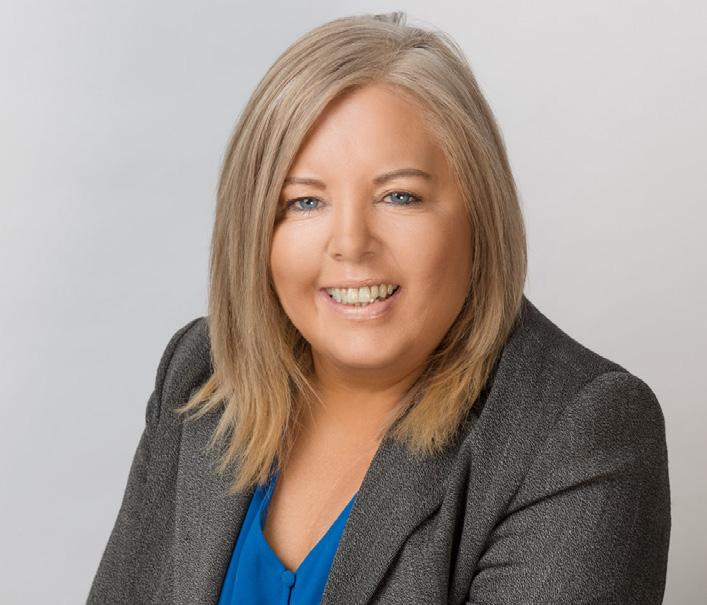
admit mistakes, and raise concerns without fear of blame or reprisal – has rightly gained prominence in recent years.
While much focus is placed on psychological safety for frontline team members, leaders in care homes also need this environment.
Leadership in care is tough. It is emotional, relentless, and unlike many other sectors, those working in social care rarely get to switch off.
The very qualities that draw people into the sector—empathy, compassion, and commitment—can also make it harder to recognise burnout in themselves.
That is why it is essential for organisations to encourage breaks away from the home, support resilience, and ensure leaders and teams alike feel protected when raising concerns or admitting vulnerability.
A psychologically safe culture:
n Frames errors as opportunities for learning, not blame.
n Protects leaders from burnout by recognising the weight of accountability they carry.
n Encourages open discussion of regulatory risks and compliance pressures.
n Offers humility and humanity, which cascades into the wider organisation.
Learning through reflection: Lessons Learned Labs
One practical way to embed this approach is through structured reflection.
At EQ Care, we host ‘Lessons Learned’ Labs – a monthly meeting open to every team member, regardless of role or level.
In these sessions, we openly discuss what has gone wrong, the learning from complaints or mistakes, and how we can change things for the better.
Importantly, we also share and celebrate great outcomes.
These sessions provide:
n Clean and clear communication around issues and solutions.
n Transparency that reassures everyone we are willing to talk openly.
n Psychological safety by showing that the organisation is committed to improvement, not blame.
The result is a culture where learning is continuous, mistakes are reframed as opportunities, and team members know that honesty will always be met with respect.
Regulation and leadership behaviour
The regulatory framework provides an important backdrop to these expectations. Under the Health and Social Care Act 2008 (Regulated Activities) Regulations 2014,
registered providers and managers are personally accountable for care quality and safety.
Transparent leadership, consistent communication, and demonstrable learning are therefore not only cultural values — they are compliance requirements.
There will also be times when issues are not immediately recognised. In these situations, it is vital for leaders to question and explore concerns, while always assuming best intentions.
This balanced approach fosters trust and encourages openness without creating defensiveness.
A care home leader who withholds information, downplays concerns, or communicates inconsistently risks breaching regulations, with serious consequences for people in their care and for the organisation itself.
Conversely, care home leaders who demonstrate openness, humility, and clarity actively strengthen compliance by ensuring governance systems are lived out, not just written in policy manuals.
Conclusion
Care homes thrive when leadership is transparent, communication is cohesive, and psychological safety is protected at all levels.
Acknowledging that things go wrong is not a weakness; it’s a strength. By focusing on solutions rather than blame, supporting leaders and teams through the emotional demands of social care, and embedding systems like Lessons Learned Labs, organisations can grow stronger, more resilient, and more open.
This approach not only meets the requirements of the Health and Social Care Act 2008 (Regulated Activities) Regulations 2014, but more importantly, it upholds the heart of social care: dignity, respect, and humanity for all.
n Samantha Crawley is the CEO of EQ Care Group and a director of the OS.
The OS is a Community Interest Company, free to all providers irrelevant of their rating. It is a platform to share and celebrate best practice, help others to improve and promote careers in social care.
Please contact Sonia – info@ theoutstandingsociety.co.uk for more information or follow the links below:

